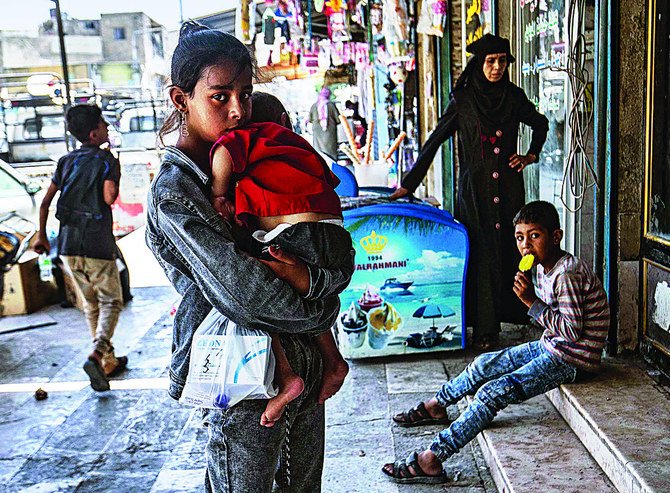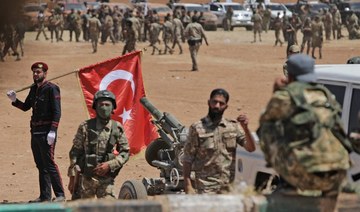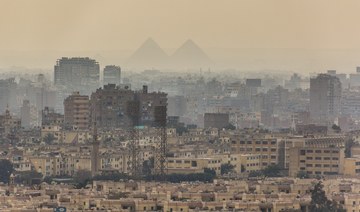MANBIJ, Syria: Ghazwan Al-Atman thought he had found refuge in Manbij after years of displacement, but he now fears his family will be uprooted once again as a threatened Turkish onslaught looms over the Syrian town.
President Recep Tayyip Erdogan of Turkey has repeatedly vowed to launch a new offensive in northern Syria in what he says is an operation to protect his country from Kurdish militias who have been waging a decades-long insurgency against the Turkish state.
Turkey has launched a string of offensives in Syria in the past six years, most recently in 2019 when it conducted a broad air and ground assault against Kurdish militias after former US president Donald Trump withdrew American troops.
“Our people are completely exhausted,” Atman said, standing in his empty shoe store in downtown Manbij, which lies just 30 kilometers (less than 20 miles) from Syria’s border with Turkey.
“We enjoyed safety and security here. Now, we don’t know where to go.”
The market where he set up shop is usually bustling with customers, but they have now been reduced to a trickle.
Atman said his family settled in Manbij in 2018 having already been displaced “four or five times.”
The 43-year-old built a house and established his business “from scratch,” but is now ready to flee again as he fears for the lives of his children.
“War has destroyed me... All we want is stability in this country,” he said.
The threat of a new assault has intensified, with Turkey saying Thursday it never seeks “permission for our military operations” despite failing to get the green light from Russia and Iran this week.
Turkish media said any potential operation is unlikely to take place before the end of August or early September.
Analysts have warned an attack on densely populated Manbij would cause mass displacement and suffering.
The people of Manbij have been busy stocking up on food in preparation.
Hussein Hamdoush said customers have been flocking to his grocery store to stockpile essentials like milk, rice and bulgur.
Hamdoush said he does not want to leave.
“Displacement means ruin,” he said. “Where will we go? I would rather die in my home.”
Food prices have shot up in the Kurdish-run town, residents say.
Umm Nidal, 48, said she feared displacement as much as she feared for her four children.
“We are facing an economic war rather than air strikes,” she said as she scanned supermarket shelves.
This is not the first time Ankara has threatened to attack Manbij, an Arab-majority town run by Kurdish fighters who expelled Daesh group militants in 2016.
Between 2016 and 2019, Ankara launched three military offensives it said were to root out the Kurdish People’s Protection Units, the main component of the autonomous Kurds’ de facto army, the Syrian Democratic Forces (SDF).
Analysts have told AFP that even without Moscow and Tehran’s stamp of approval, Erdogan could still launch a limited attack.
“Turkish threats are nothing new in Manbij, but the level of these threats ebbs and flows, and it has highly intensified lately,” said Sherfan Darwish, a spokesman for the SDF-affiliated Manbij Military Council.
The SDF has dug trenches on the outskirts of Manbij in readiness for a potential attack, AFP correspondents said.
“We have trained our forces... based on our experience fighting against IS, though the war against Turkish forces calls for new tactics,” Darwish said.
The SDF has reached out to Damascus for help in fending off a potential Turkish onslaught — as they have done in past campaigns.
Government and Kurdish forces have struggled to find common ground, because Damascus rejects Kurdish self-rule.
In the past few days, the regime has deployed reinforcements near Manbij, as part of a Russia-mediated agreement, to act as a buffer between Kurdish and Ankara-backed forces.
They have come bearing “heavy and high-quality weapons,” Darwish said.
Regime flags were visible on the front lines, while Manbij Military Council fighters were scattered farther back in small numbers, hiding from possible Turkish drone strikes in the shade of olive trees, an AFP correspondent said.
Syrian soldiers have trickled in over the past two days, setting up camp in nearby villages.
Hamdoush said he hopes the army will be able to protect Manbij, but others are skeptical.
“I wish we could have peace,” said Ali Abu Hassan, a 50-year-old Manbij resident. “But this (war) is an international game and we are the victims.”




























